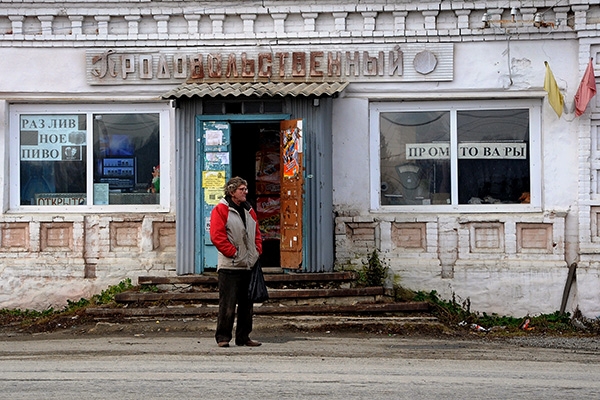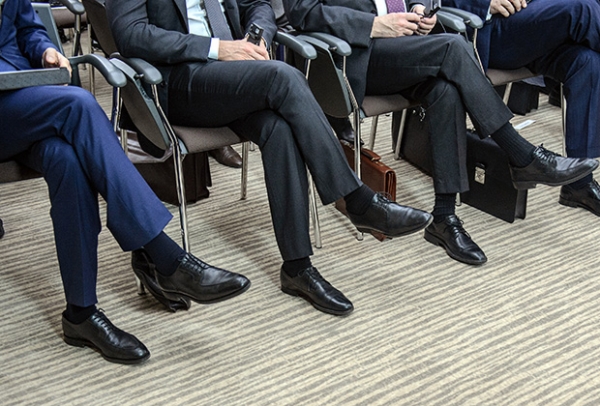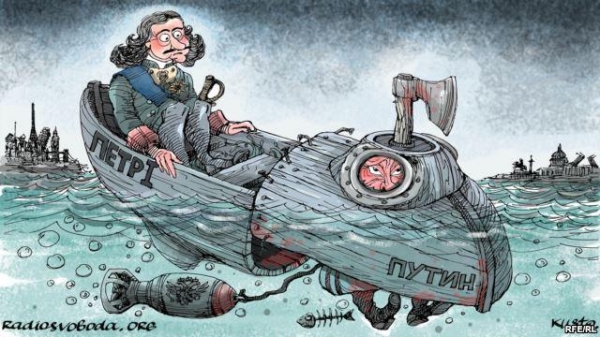
Political scientist Vladimir Gelman about why the idea of modernization in Russia is not working
What is “unworthy of the Board” and where it came from in Russia? Why in the country there are institutions and reform usually only making things worse? Can we change this? To these and other questions tried to answer the Professor, European University at St. Petersburg, and Helsinki University Vladimir Gelman in the course organized by the Yegor Gaidar Foundation and the Sakharov center lectures. “Ribbon.ru” wrote down the main points of his speech.
What is unworthy of the Board

Vladimir Gelman
In the new annual report of the organization Transparency International on corruption perception in various countries around the world to Russia were both good and bad news. On the one hand, compared with the previous year, the country has moved up 17 places. But nonetheless with 28 points out of a possible 100, it was ranked 119-th place, being in one row with such countries as Sierra Leone and Guyana. These countries are quite poor, with a low level of social development, and on this background would expect that Russia will finish in a higher position.
Even if you take some other indicators (indexes of property rights, rule of law and so on), our state will not look much better. In this case, the term “despicable reign” (bad governance) is not just a low quality Board, namely the unworthy from the point of view that the country should not be governed by any objective criteria.
It is paradoxical, but very often we see attempts by the authorities to remedy a bad situation lead to the deterioration of the situation. Why? I argue that there is established and rooted Russian ruling groups, political institutions, preventing major improvements in quality control, blocking the possibility to improve socio-economic development. In these conditions, attempts to create good rules lead to the opposite result, and there is an effect of a vicious circle.
If you look at many examples of management by various industries or territories they controlled approximately by the same scheme. This isn’t some random office due to improperly appointed person. The basis for such “unworthy” on any level is political-economic order, which is the consequence of purposeful institution building. Attempts partly to improve something, while not changing the whole order as a whole, produce effects that, for example, was observed on the results of reforms in the Railways. In other words, to circumvent this political-economic order is impossible.

Where does unworthy the Board
In the literature there are two popular points of view. First, it is disgraceful the Board due to the nature of the preceding historical development. The whole historiography of Russia since the famous book by Richard pipes “Russia under the old regime” is about how in different times the country were poorly managed due to the fact that he couldn’t guarantee political and economic freedoms, property rights. From the point of view of the pipes and many of his followers, is just a kind of reproduction of the former order management at every historical stage of development of the country.
The conclusion is that if any country or people cannot be corrected, the logical consequence is the destruction (as in the case of chronic hereditary disease that is passed from generation to generation). This is an extremely pessimistic point of view, but nevertheless it remains very popular in foreign and domestic literature. However, empirical research is sometimes not only not confirm, but directly contradict it.
Another view suggests that actually the country that are so poorly managed that by themselves are good, but at some point in time they are going through a very serious injury associated with the demolition of the historical development. For African States, for example, many say that attempts to overcome underdevelopment, imposed during colonialism, encounters with failure for modernization, and hence the reaction in the form of finding ways to survive in the order of the Board that had characterized the country for decades and even centuries ago.
If we talk about the post-Soviet States, the collapse of the Soviet Union and the related issues of state building plus simultaneous economic and political reform has left such deep traumas that they cannot be overcome quickly. You will need a very long therapy in the form of a long period of economic growth, that will eventually get rid of the vestiges of bad governance and exit to the correct path.
But if you look at specific examples, the cause, at least Russian-related disease unworthy by the Board, is not heredity and not the karma of the collapse of the Soviet Union. In medicine it would be called poisoning.
For example, Russian Railways for many years been a kind of personal fiefdom Yakunin as the result of rational action on the division of rents between the participants of the “winning coalition”. In these conditions, attempts to improve the management, to carry out some socio-economic reforms only facilitate the implementation of interest associated with the receipt of rents.
We can say that all around the world are interested to extract rents. But in some countries against rent-seeking, there is quite successful antidote, but in the Russian case, for reasons primarily political, it just remains unclaimed.

Since the main purpose of content and management of the state with unworthy rule is the extraction of rent, respectively, under this locked up the entire mechanism, presented in the form of a single pyramid. This hierarchy applies not only to the governance of the country. All political and economic agents in relation to the centre of power can have some autonomy, but it is conditional.
At any time you can cancel it. For example, to close down an organization after a surprise inspection. Important here is not the facts associated with the use of those or other steps of power, but rather the expectation that they are possible. All the formal rules, laws, regulations, certificates of ownership are not more than the product side of the distribution of resources within the power vertical. They act only when it doesn’t inhibit profit.
But vertical power is not uniform and contains many branches. Accordingly, the management apparatus is distributed between different groups competing for access to the rents. These principles can be more, and they make up the core of the political-economic order worthy of the Board.
Formal institutions — a shell, resembling the attributes of developed countries, but they work only when serving the interests of rent seekers. Hence at the political level we are witnessing an authoritarian regime — in the framework of capitalism is the so-called nepotism. The paradox is that although such political and economic order is extremely ineffective and widely criticized, it is quite stable.
In Africa the result of this inefficient equilibrium becomes unstable stagnation. For example, was called the Zaire dictatorship of stagnation during the reign of Mobutu, who ruled the country for 32 years and went down in history as a legendary embezzler of public funds.
In Russia in 2014 was some kind of militaristic turn, which resulted in a very large-scale redistribution of rent flows. But in the post-Soviet countries (particularly the us) showed completely different trends, and as the goals were put forward economic growth and development. The slogan of modernization was not an ordinary rabble-rouser. On the contrary, in the early 2000-ies saw the light of the programme of German Gref “Strategy 2010”, and the points put forward by Medvedev later, become its logical continuation.
Why does Russia need reforms
But what the Russian authorities needed the strategy as part of unworthy of the Board? On the one hand, there is an understanding that the more money is allocated to development, the more rent you can assign. But beyond these pragmatic material circumstance, was the fact that pretty much makes Russia and Africa, and from some post-Soviet neighbors. Sociologist Vadim Volkov called this phenomenon the status of the needle. It assumes the existence of the idea that Russia is a great country that must do something meaningful, noticeable. Hence the desire to hold the Olympics, then any global forums.
Of course, the narrow modernization does not entail political liberalization because it threatens to undermine the political status quo, and limited to the economic sphere. The experience of the changes that occurred during the presidency of Dmitry Medvedev, this is clear.

There is a certain demand for quality state of the economy, higher rates of economic growth. Including have the desire to climb in the international rankings and thus achieve symbolic recognition. The customer of the reform acts of political leadership. There are officials, driven by career motives, and there are developers of reform programmes and experts, often sincerely believing that may not fully, but partially some reasonable ideas they will implement.
As the country reforms? For example, a team of experts prepares the decision, puts it on the table the first person, and it begins to become a reality without serious public discussion, without a debate in Parliament and coordination with stakeholder groups. But in terms of action such informal institutional core there is an effect not a deliberate damage or distortion, as happened with the Russian Railways. The management of the Railways after the reform program was implemented that it was profitable for him, and the rest remained only on paper.
Thus the upper floors of the vertical of authority — senior government officials and associated businessmen extracted rent. What remains on the lower floors? There they receive too few benefits and too many costs to do something. Then the fact that the American anthropologist James Scott has called the movement of high modernism, when the aim of the reforms is the achievement of formal indicators, which creates the criteria of regulation parameters.
The consequence of this policy reform — a rapid growth of regulation and the tightening of its scale: since no one at the bottom will do, we need to give the installation and put the lower floors dependent on the achievement of these indicators. Accordingly, increasing costs of control.
Improving the quality is a big question. There are a few success stories, such as the tax reforms of the early 2000-ies. But this is more the exception that proves the rule, failure a lot more. Police reform in early 2010-ies — this is the story of institutional failure, turn from bad to worse.
Is it possible to reform institutions
In an article, the heads of the Higher school of Economics, published in 2005, stated that there are two strategies of socio-economic reforms, associated with an attempt to circumvent this informal institutional core. One of the borrowing institutions, the second is their growing.
But experience has shown that borrowing institutions leads to what economist Andrei Zaostrovtsev marked with the word “chitinase” (shit). An illustrative example is the idea of creating e-government. When President Dmitry Medvedev on this, we allocated significant resources, appointed a special Minister. Although the practice of e-government exists in many developed countries, where it serves as a parallel mechanism that complements existing democratic institutions and not by the Institute, their substitutes.
In the Russian case, it has turned into a mechanism for electronic petitions. You can write a letter via the Internet to some great chief, and you must answer. But as soon as it comes to something more serious, then the fire barriers.
Moreover, the borrowed institutions also adapt easily to special interests (say, transfer to the auction of state functions). Illustrative example — system “Platon”. In other words, the development of these new institutions is becoming a new source of rents.
The second method is the cultivation of institutions. This cultivation of new governance arrangements in a very limited scale under political patronage. On the one hand, the age of patronage short-lived. For example, with the center “SKOLKOVO”, which was created with great fanfare, and is now experiencing not the best times. On the other hand, the dissemination of innovations beyond these “pockets of efficiency” encounters resistance from the other applicants rent. Moreover, there is a risk that not these oases of excellence will rebuild the surrounding country, but on the contrary, the surrounding country will rebuild their own image and likeness. So a vicious circle is unworthy of the Board, and there is a big question about whether it is possible to terminate it.
How to avoid unworthy of the Board
It is clear that there are high hopes for political democratisation, that a change of government will entail the collapse of the unworthy reign, and from its ruins will grow a decent Board. There are, however, many arguments in favor of the fact that this condition is necessary but not sufficient. Much more likely it may be the replacement of one unworthy of the Board to another.
If you look at the example of Ukraine in the last two years, its leadership, in General, have not spent any serious transformation to get rid of this institutional core. We can say that the change was made, some of the crooks and thieves on the other crooks and thieves.
It is also believed that the parliamentary system has great advantages compared to presidential from the point of view of preventing the monopolization of power. However, in terms of quality control such connection, in General, is not obvious. Examples unworthy of the Board can be found in parliamentary systems where there is more incentive to ensure that the rents are distributed among a large number of participants. Still, the monopolization and personalization of power greatly contributes the most prominent pathological manifestation unworthy of the Board.
Another important mechanism is globalization, integration into the international division of labour, global markets, global economy. But globalization itself is not something unworthy of what the Board does not adapt. It is quite well embedded in its processes, creating various interfaces and government agencies. Examples of this pretty much in those same African countries.
The sovereign status of the country — very strong obstacle to the improvement of the quality of governance. Sovereignty acts as a shield for job seekers of rent in relation to external influence.
There is a very important question about the limits of the sovereignty from developed countries. Such a restriction is rare because it is expensive. However, I do not exclude that the current crisis can serve as an external shock, which will entail both internal and external pressure to facilitate the exit of our country from this trap.
The main problems of the country lie in the plane of political institutions. The question is how these institutions can be changed, and if this is even possible. I suspect that in Russia, these changes are unlikely to happen without any big shocks.

Examples worthy of the Board
Examples of building good governance in the modern world not so much. If you look at the experience of South-East Asia, in the period when they formed the modes of the Asian tigers, in General, managed to achieve some progress. Or, for example, the reforms carried out by Mikheil Saakashvili in Georgia, still pretty much improved the quality of public administration. However, their effect was inconsistent. Moreover, some of these reforms after Saakashvili has ceased to be Georgia’s leader, was revised and reversed. But compared to those observed in Georgia until Saakashvili, it still was a very big step forward.
Another example is South Korea and Park Chung Hee. Paradoxically, when the country underwent democratization, quality of management has declined. However, South Korea has become a very specific example where, on the one hand, it was very good combination of internal conditions for relatively good quality control and very important external stimuli (the threat from North Korea and the U.S. support that the South Korean leadership has been successfully used).
So there are such examples, but in General much more cases, when once embarked on the path of bad governance, countries are unable to go with him.








